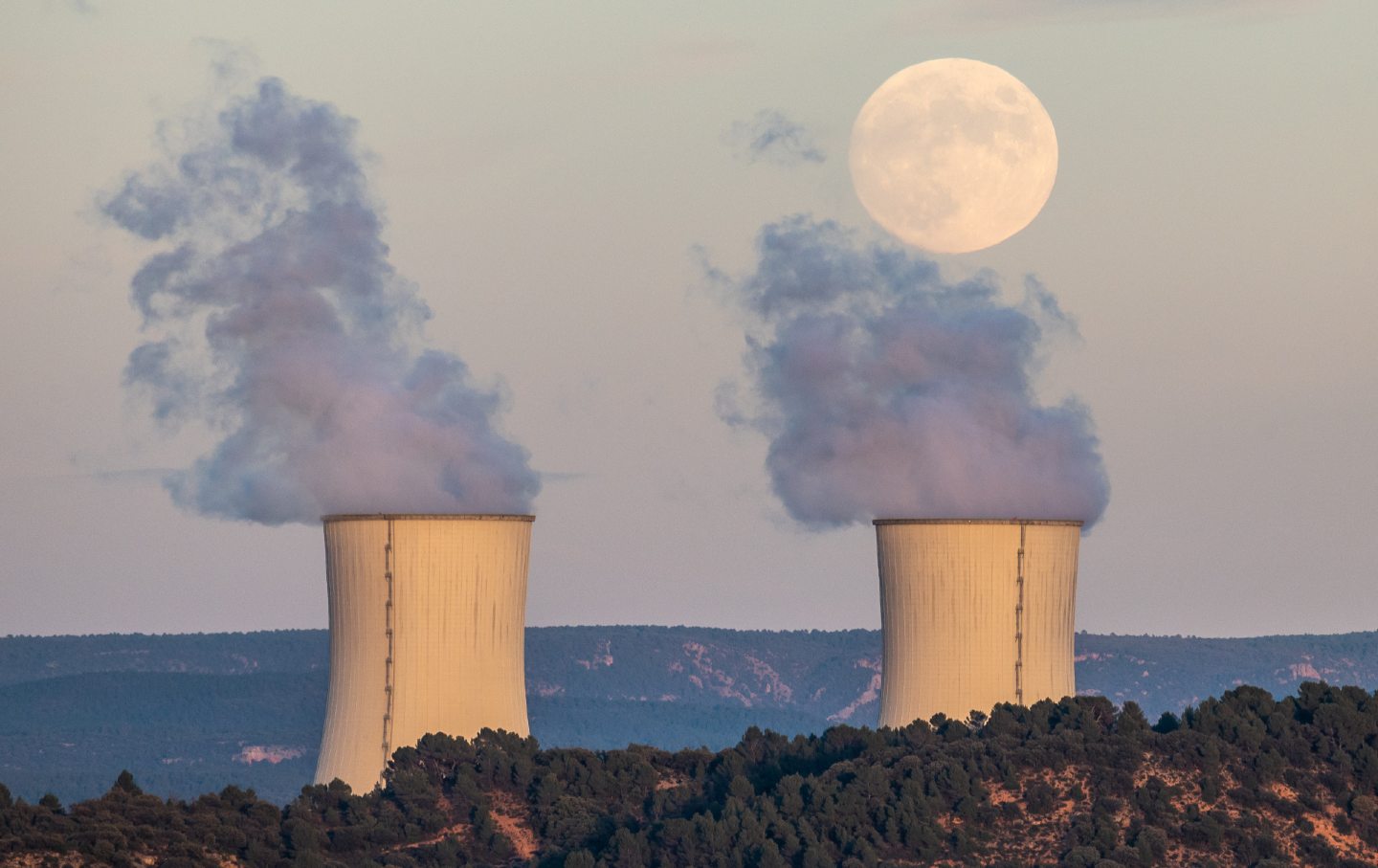These Activists Are Right: The World Doesn’t Need Any More Private Jets
Local activists in Massachusetts have taken on the private jet lobby—and they might just win.

A Gulfstream G650ER jet prepares to land at Ronald Reagan Washington National Airport on November 7, 2023.
(Kevin Carter / Getty Images)Concord, Massachusetts—A struggle that pits regional environmental activists against an airport expansion for private jets has national—and even global—implications.
Private developers have proposed a massive new private jet facility, doubling the jet hangar capacity, at Hanscom Field, New England’s largest general aviation airport, already with 38,000 private jet flights annually. Hanscom is owned and operated by Massport, a public authority that also owns Logan International Airport in Boston, the region’s largest commercial airport, and Worcester Airport.
Hanscom Field is located in Bedford, Concord, Lexington, and Lincoln, Massachusetts—communities renowned as the location of the first skirmishes in the American Revolutionary War in 1775. This April, as the Commonwealth celebrates the 250th anniversary of the “shot heard ’round the world,” activists across the state will be celebrating a year of organizing since 20 activists were arrested for occupying the tarmac and temporarily closing the airfield in protest of the expansion.
Frequent fliers in and out of Hanscom include billionaire Robert Kraft, owner of the New England Patriots, and John Henry, the billionaire owner of the Boston Red Sox and the Boston Globe, the region’s largest newspaper. In October 2023, the Globe ran a front-page story with the headline, “Billionaires are responsible for large amounts of climate pollution from Hanscom, a new report finds.”
The fate of the airport expansion lies with the Massport board. Massachusetts Governor Maura Healy has not taken a position, waiting for the environmental review process to play out. A statewide coalition of more than 100 organizations opposes the expansion, arguing that the proposed hangars will lead to increased jet operations and dramatic increases in greenhouse gas emissions.
After the hottest two years on record, private jets are under renewed scrutiny as one of the most carbon-polluting modes of transportation in the world. A new international study from Sweden found that carbon dioxide emissions from private jet travel surged 46 percent between 2019 and 2023, with 68.7 percent of the private jets registered in the United States. In 2023, direct private jet emissions were 15.6 tons, with an average of 3.6 tons per flight.
The Swedish study found that only 0.003 percent of the population use private jets, around 256,000 people worldwide. Each of them produces nearly 500 times more carbon dioxide in a year than the average citizen. The study also found that half the flights (47.4 percent) were shorter than 311 miles, and “flight pattern analysis confirms extensive travel for leisure purposes, and for cultural and political events.” An October 2023 study that I co-authored found that at least half the private jet flights out of Hanscom go to recreation destinations like Nantucket, Martha’s Vineyard, or the Super Bowl.
Private equity investor Jeffrey Leerink, of Leerink Partners, is one of the two lead private developers of the Hanscom expansion. For years, Leerink has served as a close private-equity adviser to Steward Health Care and its billionaire owner, Ralph de la Torre, disgraced for his milking cash from the hospital chain while buying yachts and jets.
Leerink helped de la Torre unload a group of failing Utah hospitals in 2023 and is one of the investment bankers embroiled in the Steward bankruptcy that threatens the future of hospital services for thousands of Massachusetts residents. Leerink, and his development partner, Norwood Cadillac dealer Michael Argiros, have no prior experience with aviation.
The private jet lobby and its billionaire clients are used to getting their way, especially with public airport authorities that have been effectively captured by the aviation industry and view their role as promoting a rapidly expanding aviation sector. But a statewide coalition, Stop Private Jet Expansion at Hanscom or Anywhere (SPJE), has aggressively challenged Massport and Leerink’s Runway Realty Ventures LLC at every step along the way.
As part of their campaign, over a dozen cities and towns from across the Commonwealth have passed resolutions to reject the proposed expansion, and over 14,000 individuals have signed a petition to the governor urging her to halt the proposal. In April 2024, 20 protesters from Extinction Rebellion blocked operations at Hanscom, demonstrating that activists are prepared to engage in nonviolent direct action to stop the project if the expansion proceeds.
In the last eight months, the anti-expansion campaigners have turned the tables on the powerful private jet lobby.
Endangering National Treasures. In May 2024, because of the threat of the proposed Hanscom private jet expansion, the National Trust for Historic Preservation designated Minute Man National Historical Park, Walden Pond, and nearby landmarks as one of America’s 11 Most Endangered Historic Places, thereby bringing national attention to these ill-conceived private jet plans.
Responding to Developers’ Environmental Proposal. Earlier in 2024, Leerink’s team of developers submitted an environmental proposal for the Hanscom expansion to the Commonwealth that was replete with fantastic and shoddy claims and projections. Leerink’s team declared that their 522,000-square-foot proposed hangar expansion to house 66 to 79 additional private jets would decrease private jet operations at Hanscom and would actually reduce emissions. But independent research conducted by Industrial Economics Inc. found the opposite: that the Hanscom expansion would add approximately 6,000 private jet flights a year, adding around 150,000 tons of carbon dioxide annually over current levels.
Popular
“swipe left below to view more authors”Swipe →Over 1,500 public comments were submitted to Massachusetts environmental regulators, most overwhelmingly opposed to the project. Many commenters pointed out that if expansion proceeds, private jet emissions from Hanscom alone could cancel nearly 70 percent of the environmental benefits of all the solar photovoltaic (PV) ever installed in Massachusetts and undermine the state’s ambitious climate plans.
In June 2024, the state’s top environmental official, Rebecca Tepper, sent the developers back to the drawing board, ruling that Leerink and developers “did not adequately or properly comply with regulations.” The developers must submit a revised environmental statement to fill in the large information gaps in their proposal, including responding to the Industrial Economics study. That revised report is still pending, but Massport anticipates a resubmission before the summer of 2025.
Changing the Massport Charter to Address Climate Change. Activists recognized that part of the problem was Massport, an agency founded in 1956 with the mission of promoting civil aviation and economic growth. They pushed for a fundamental shift in the agency’s charter. In November 2024, the Massachusetts legislature passed a comprehensive climate bill that included an update to Massport’s charter to require the agency to address greenhouse gas emissions from aviation.
The revised charter requires the agency to promote “environmental protection and resilience, reductions in greenhouse gas emissions, and environmental justice principles” in its decision-making. Massport’s initial charter was written in an era of booming aviation growth, prior to any understanding of climate change.
The legislation, signed by Massachusetts Governor Maura Healey, passed by wide margins in the state Senate with a 38 to 2 vote and House vote of 128 to 17. Most Massachusetts lawmakers understand that private jet expansion at Hanscom is a direct and immediate threat to Massachusetts’s efforts to combat climate change.
Opponents of Hanscom’s expansion are urging Massport and state officials to reject a project that benefits only a tiny sliver of billionaires but sets off a carbon bomb of pollution. They argue that expanding private luxury jet services during a climate emergency is indefensible and irresponsible. Oxfam’s new report, “Carbon Inequality Kills,” observes that “private jets and yachts—aren’t just symbols of excess; they’re a direct threat to people and the planet.”
Climate activists worldwide have been calling for an end to new oil, gas, and coal infrastructure as a critical stage in reducing emissions and making the transition to a clean energy economy. In the coming months, the eyes of the world are on Hanscom Field and whether this expansion project will be defeated.
More from The Nation

The False Promise of Nuclear Power The False Promise of Nuclear Power
A new book by Joe Romm explains why nuclear is not much of a climate solution.

Peter Kuper’s Graphic Novel, Where the Insects Draw Us Peter Kuper’s Graphic Novel, Where the Insects Draw Us
Insectopolis explores the often-unseen—and rapidly disappearing—world we share.

So Much for Saving the Planet. Climate Careers Evaporate for the Class of 2025. So Much for Saving the Planet. Climate Careers Evaporate for the Class of 2025.
The Trump administration is disrupting career paths for new graduates hoping to work in climate and sustainability, international aid, public service, and the sciences

If You Think Multinational Mining Interests Want to Save the Environment, I’ve Got a Bridge to Sell You If You Think Multinational Mining Interests Want to Save the Environment, I’ve Got a Bridge to Sell You
A sacred site for Native Americans is on the verge of being destroyed for profit, and profit alone—just one more colonial conquest of lands in the American West.

Warren Buffett Is a Climate-Wrecker Warren Buffett Is a Climate-Wrecker
Los Angeles Times climate columnist Sammy Roth scoops his business beat colleagues.

The Climate Costs of Occupation The Climate Costs of Occupation
As Israel expands its settlements in the West Bank, it has destroyed forests and boosted CO2 emissions.


